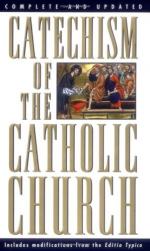
|
| Name: _________________________ | Period: ___________________ |
This test consists of 15 multiple choice questions and 5 short answer questions.
Multiple Choice Questions
1. Will there be resurrection of the bodies of the deceased?
(a) Probably.
(b) Yes.
(c) Maybe.
(d) No.
2. Why is the New Testament affirmed as the continuation of the Old Testament?
(a) Since characters in the Old Testament are mentioned in the New Testament.
(b) Since Christ's arrival has been predicted by and prepared for through the Old Testament.
(c) Since both books share the same God.
(d) Since they have the same authors.
3. What might liturgy be?
(a) Acts that the lay assistant performs during a mass.
(b) Acts of charity towards the local community.
(c) Acts for the good of the Church.
(d) Rituals the priest performs.
4. How can others be brought into belief?
(a) Through the Holy Spirit.
(b) Through education and exposure to Christ's teachings and miracles.
(c) Through education.
(d) Through prayer.
5. What does the Christ mean?
(a) Our Beloved.
(b) The Messiah.
(c) Father.
(d) Son.
6. What did the Jews offer to this Savior God?
(a) Love.
(b) Their first born.
(c) Animal sacrifices.
(d) Prayers of devotion.
7. How does Man's Response to God begin?
(a) People and God meet during daily activities.
(b) God comes to everyone at birth.
(c) God seeks out friendship with people through daily activities.
(d) People seek out friendship with God through daily activities.
8. The Catechism offers _____________ means by which to help understand the real literal significance of what is written.
(a) Five.
(b) Four.
(c) Two.
(d) Three.
9. How many kinds of men were anointed by the Israelites?
(a) Six.
(b) Five.
(c) Four.
(d) Three.
10. Who invoked the Savior God?
(a) The people.
(b) God.
(c) The high priests.
(d) The priest's assistants.
11. The Church is meant to support what transformation of the world on Earth?
(a) Into a paradise for all.
(b) Into the Kingdom of God in Heaven and upon the Earth.
(c) Into a place of harmony and love for all.
(d) Into a peaceful place.
12. What is done in an effort to better know Jesus?
(a) He is related to the reader in very human terms.
(b) His life is described in vivid detail.
(c) Information is provided regarding to the title by which He is known.
(d) His human experiences are emphasized.
13. Who worked on this book?
(a) Bishops.
(b) Church officials.
(c) Catholic congregations.
(d) The Pope.
14. The Apostles' Creed and the Nicene Creed are presented as what, which are a normative part of Catholic Mass?
(a) "God's rules" together with "Jesus' rules."
(b) "I believe" together with the "We believe."
(c) A prayer to God together with a prayer to Jesus.
(d) The rules one must follow.
15. People are advised to have the view of _____________________.
(a) Children to parents.
(b) Teachers to children.
(c) Children to teachers.
(d) Parents to children.
Short Answer Questions
1. Who fears the name of Jesus?
2. Of what was Jesus the cornerstone?
3. How is the word creed defined?
4. For whom is baptism?
5. What are the twelve apostles intended to represent?
|
This section contains 519 words (approx. 2 pages at 300 words per page) |

|




